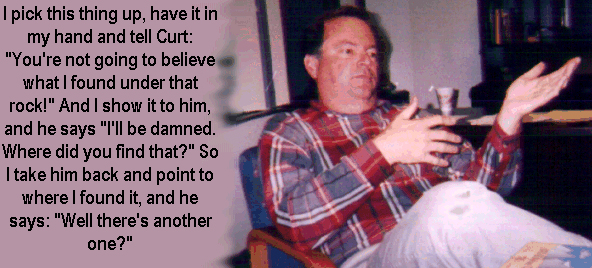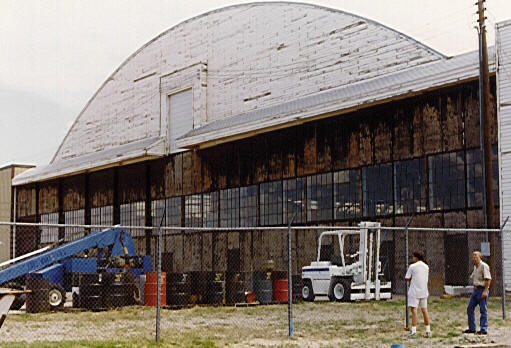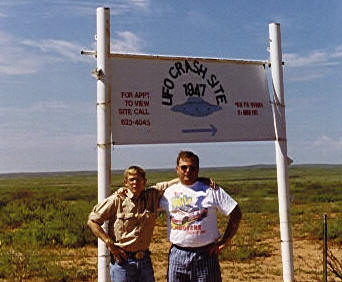 CONTINUED
CONTINUED
 CONTINUED
CONTINUED
KENNY YOUNG: Now again, you're talking about the Ragsdale site. Hasn't the Ragsdale account been discredited?
LARRY ROGERS: In their later books, Randle and Schmidt have discredited the account. The museum people will tell you that this is the real crash site. It just happens to be on Federal property, where there is no issue concerning who holds the rights to take tours. So anyway, I go back there, and I sit down on a smaller rock next to the big rock. I am taking some notes while Curt is taking measurements and looking at compass bearings -- we were trying to determine where northwest was. I am in somewhat deep thought, sort of day dreaming, when I notice something lying on the ground not more that five feet away. I don't believe this, I think to myself. I can't disclose what it was.
That large rock has a curved shape at its very bottom. I see a shiny object back up under the edge of the rock, just where it meets the ground. I holler for Curt, to tell him to come and look at what I had found. I pick this thing up. I have it in my hand and tell Curt You're not going to believe what I found under that rock. I open my hand to show it to him, and he says I'll be damned. Where did you find that? I take him back and point to where I found it. I kneel down, and point to the exact spot. Amazed, he says Well there's another one.
CURT ROBINSON: That is no lie, we found another one right there.
CHRIS COFFEY: Could this stuff have been planted?
LR: Well, we wondered the same thing. It certainly appeared to be old, although we found it in plain sight. It was just located in place that you would not normally look. Remember, I was taking notes. I was in one of those trances you get into when trying to put down in words something that is not easy to explain. The only reason that I noticed it was because my stare happened to be in the right direction. Remember that first thing we found while driving up? We could tell that thing had interacted with nature over a number of years. We know it could not have been planted, at least if it was, it happened many, many years ago. No, there was a lot of decay involved. The second things we found could have been planted, I suppose, but I don't know why anybody would do that.
CR: You wouldn't plant the things we found. They don't fit the story in such a way that it would make sense to plant them.
LR: To us there was no apparent connection to the story, except for one bizarre twist that occurred to me over dinner, later that night. That was the point at which I got a bit shook up.
CC: But it was enough to get you on the right path?
LR: Well, let's just say there would be NO WAY that THAT belonged there. There are two tracks we tell of in the book. One track is about Curt and I, and everything we have done along the way. The other track is a historical track, in which we write about what happened in 1947. To help the reader visualize how the well known testimony of the crash witnesses fits with our findings and the documented history of the period, we have created scenarios, and we always tell the reader when we do this, where we connect one piece of the puzzle to another. There is one chapter in fact, which I wish now I had entitled 'Roswell for dummies.' We included this one for the reader who may not have heard of the Roswell incident before picking up our book. That reader would need to know certain fundamentals.
CR: That's the disadvantage, because some people aren't familiar with the Roswell story.
LR: So anyway, back to the top of the mountain. I am telling Curt that this has been a really weird day.
CR: Right, and about that time, we find something else. I'm not going to tell you what we found, only because right now, it's best we not. If people knew about it, there might well be a stampede up there. All we will say is that while we were there, we made a new discovery...
LR: We were walking back toward the road, ready to leave.
CR: It was quite bizarre. Really interesting. I wanted to go back, later that night, under the cover of darkness. It was wild.
LR: We drove into Roswell, and it was pretty late. We went to a nice steak house in Roswell. I think it was around 10 o'clock. I was ready to have this day be over, but as we always do at the end of a day like that, Curt and I were discussing the artifacts we had brought back. I thought perhaps we should turn over one thing in particular to the local law enforcement authorities.
CR: We won't tell you what it was, but Larry thought the right thing to do would be to turn it in.
CC: Turn it in for what reason?
LR: I don't really want to go there.
CR: We're not going in that direction, period. We can't tell you.
LR: I just felt like we shouldn't have left the state of New Mexico with this in our possession. I really wanted to get rid of it... I just didn't want to have it.
CR: He was chicken, that's what it was all about. Then we found something else up there, a couple of things up there, before we left.
LR: Don't call me chicken. You were wanting to go back and here I'm wanting to go to the police and turn this stuff in... I was really a basket case.
CR: It's all strange. I mean, why did we go to this site? I suppose, deep down inside, we felt that there wasn't anything significant about this site, as people claim. When we get to the site, strange things start happening to us. All of the strange things which happen to us fit into the overall mystery, so to speak, but only Larry and I know that as we sit in this room. It fits into the mystery -but has nothing to do with the mystery- but it IS part of the mystery.
LR: As we sat there in the restaurant at the end of the day, we didn't see things as we do now. After we reflected upon it, we began putting things into perspective.
CC: You had made a comment to us once that this case will one day be included in history books. Did you come to suspect this at that time?
LR: Well, you're getting real close to areas we can't discuss. We can't cross that line.
CR: Let's not go there.
KY: Tell us why we can't cross that line.
LR: The details are in the book. We have to leave some things to the imagination -- for now.
CR: Yes, it could change history as we know it.
LR: As far as what becomes history, let me tell you about a similar situation concerning a man by the name of Paul Brown, who writes on-record that, while a patient in a military hospital, he witnessed the tearing-off of the front-pages of The Honolulu Advertiser on Saturday, November 30, 1941. He happened to acquire one of those front pages, and included it in a letter to his parents. Of interest is the headline: it said 'JAPS MAY ATTACK OVER THE WEEKEND.' The U.S. Military ordered all of the front pages of this day's newspaper torn off, but did nothing for to increase the security of the base. Some twenty years later, Brown is going through his deceased mother's belongings, and finds that she had kept all the letters that he had sent home during the war. He wonders about that newspaper. He finds it. It turns out to be one of only two original copies now in existence. The other belongs to the archives of the State of Hawaii. Does this event re-write history books?
CR: You don't see history books re-written right now, do you? Let's put it this way... if you or I were writing the history books, they would be changed. How's that?
Famous hangar at Roswell Army Air Field taken in
1996
 LR: That story
I just related to you is true. It has changed the way I think about 1941.
Now, have I read in history books that the United States government was
looking for a reason to get into The War? No. Public opinion must be positive
about it, the leaders felt. What better way than to be attacked? We basically
had big signs that said 'drop your bombs here.' Oh, by the way, some darned
reporter had to find out about it, so darn him, we had to tear off the
front pages of his newspaper.
LR: That story
I just related to you is true. It has changed the way I think about 1941.
Now, have I read in history books that the United States government was
looking for a reason to get into The War? No. Public opinion must be positive
about it, the leaders felt. What better way than to be attacked? We basically
had big signs that said 'drop your bombs here.' Oh, by the way, some darned
reporter had to find out about it, so darn him, we had to tear off the
front pages of his newspaper.
CC: Could you see a similarity in the way history presently views Pearl Harbor and how we will one day think of Roswell?
LR: Even after fifty years, things can happen that really change the way you look at certain events.
CR: Yeah, you can certainly change history as what is fact... if you care to believe it. In order to write a history book, all you have to do to write it is to believe it. What has to happen in order for someone to say 'this is now history.' How many people have to believe it? Does it have to be The United States or another country?
LR: One person has to believe it.
CR: And then it becomes history.
LR: I can pick up one history book that talks about those darn southerners, and I can pick up another which talks about those darn northerners.
CR: So when you ask if this will have an impact on history... yeah, it probably will.
CC: Do you think that your discoveries will continue the controversy around Roswell, or will there still be two different camps believing different things?
LR: I wish I knew the answer to your question. I read the newspaper daily. To me, our current political problems are real clear. Yet, if we are to believe the polls, 70 percent of the people don't get it. Now, 1947 is real clear to me, but I suspect there will always be a controversy.
KY: Are your findings factually based or subject to interpretation? Will your readers come away knowing for sure that your findings are in order?
LR: There is a lot of history in our book. A lot of documented history, and here again, based upon the person that believes history, I guess, the reader will find the book extremely factual.
CR: We haven't been able to disprove anything we present, how's that?
CC: How will you feel after the book has been reviewed, and you are confronted for this evidence. Are you going to be forthcoming with your findings?
CR: Once the book comes out, we'll not hold back any punches. We'll say: There it is. There you go. Is it history or isn't it? You'll have to decide.
DANNY RUSSELL: Did you confine all of your research to this area, or do you venture into other subjects?
CR: Yes. We have no idea what happened in 1982 or '85 or '87 or yesterday morning.
LR: Well, I could tell you what happened in 1974. That's in the book, when I was in the military when we spent the better part of an hour one night tracking something strange by radar. We do talk about that.
KY: Does Wright-Patterson Air Force Base play a significant role in your book?
CR: Wright-Pat plays a role in the Roswell story, but we don't talk about that in the book.
KY: So you never address the alleged wreckage being taken to Wright-Pat?
CR: No.
KY: Any comments on the weather balloon scenario?
CR: We won't discuss it.
CC: What was your focus that motivated your approach?
LR: We would go to the library and just read magazines from that time period. We spent a number of afternoons downtown reading LIFE or LOOK magazine, starting from 1944 or 1945, just to get an understanding of that time-period. It's hard to analyze things now in our time frame of lasers and computers compared with how people thought back then. We tried to figure out why people would say what they said and do what they did back in 1947.
KY: Let me go back to the weather balloon story. Are you comfortable that this explanation was or was not satisfactory.
LR: Oh, it's all a cover story. It's all a cover story.
CR: So was Project Mogul. That's a cover story. The crash dummies and Case Closed, that's all a cover.
KY: Any comments on Lt. Col. Phillip Corso and his sworn affidavit?
CR: Well, he passed away. He was entertaining. When you bought his book, you spent your money and got something entertaining to read. He does have some historical data in his book, that is positive.
LR: We both have a copy of it.
KY: Have other Roswell researchers had the chance to find out what you know, or could have blundered upon your findings at some point eventually, and do you make any comments on these researchers?
CR: We don't form any opinion on those people. Some do good work.
LR: Everyone has a different opinion.
KY: How about Jim Knippenburgh? How did he come upon your story?
LR: My brother wanted to read the book really badly. He felt like he could help Curt and I out by doing us a favor and contacting a reporter. It was coming upon the 50th anniversary of Roswell, so he called The Cincinnati Enquirer... he 'kind of' asked us if he could do this, so we didn't really have any big objection. He called down there and talked to Knippenburgh... that's about all he knew.
CR: That's how the thing got started, because we weren't going around telling anybody that we had this book. We hadn't done this for the money, we would keep spending money. The book became the document of the 'solution to Roswell.' Here was a mystery to be solved. We didn't really care that much about the monetary end of it... so anyway Knippenburgh called up and that's how the whole thing became public.
KY: Did you have to tell Knippenburgh what you know in order to get him to publish this article?
LR: We didn't tell him any more than what is in the article. We did have a copy of the book laying in front of him though.
CC: Did you have any reservations about coming out with this story, either out of fear or obligation?
LR: I continue to have reservations.
CR: I am not 100% sure that any of us really NEED to know what REALLY happened at Roswell. We're not sure that people should really know that.
KY: In the Knippenburg article, he quotes you as saying that what happened is the 'tip of the iceberg.'
CR: It's the tip of the iceberg because there is a lot more to the story. There's much more to the story. The book is around 300-pages. It might take a week to read it.
LR: A lot of the content is footnotes.
Larry and Curt at the turnoff to the Corn Ranch crash site
taken in 1996

CR: The more we researched, the bigger Roswell got. We couldn't find the edges, as if it were a puzzle that kept getting bigger. We think we solved the mystery. We found something.
KY: How many years have you spent investigating this case?
LR: At least a two-year investigation. As we researched this topic, we collected a library of books. When we would see something we would mark the page. That might result in a new thread, which would then take us down another path, where we would have to buy ten more books.
CR: We studied everything on Roswell we could get our hands on.
LR: As I worked through this, I decided to keep track of what this was costing me. Last year alone I spent about $4,000.00 in research expenses, travel and books.
CR: That's last year alone. I would estimate that we've spent close to $20,000 each.
KY: What can be said to all the skeptics and debunkers who have ridiculed the Roswell story?
LR: Which Roswell story?
KY: The general consensus has been that the incident has been created by a crashed weather balloon.
CR: It wasn't no weather balloon, but something did crash.
PART
THREE OF FOUR
1
| 2 | 3 |
4